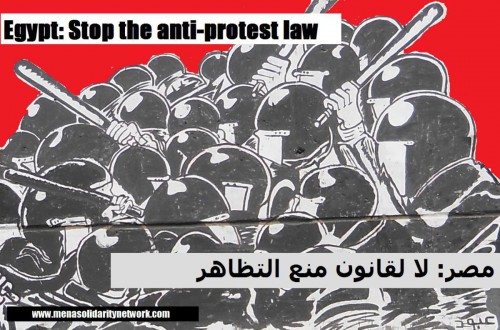For Egypt / For Freedom
by Hamdy El-Gazzar and translated by Amani Elmawed / July 14, 2014 / No comments
After recent arrests, Egypt’s intellectuals petition against the repressive demonstration law.

Poster calling for end to Egypt's new protest law. Credit: Solidarity with MENA Workers Network
Because of the recent arrest of 24 activists , including seven women charged with “breaking the law of demonstrating, damaging public and private property and demonstrating power,” hundreds of Egypt’s prominent intellectuals, along with the country’s creative youth, have issued the following statement:

- “From Egypt” attempts to draw a cultural map of Egypt and the Arab world by profiling the artistic, literary, and political issues that affect the region via on-the-ground coverage of current events, publications, and the fight for freedom of expression.

- Hamdy El-Gazzar is an Egyptian writer and one of the 39 young Arab writers included in the Beirut 39 Project. His first novel, Sihr Aswad (Dar Merit, 2005) won the prestigious Sawaris Award, and was subsequently translated by Humphrey Davies (Black Magic, AUC Press, 2007). His second novel, Ladhdhat Sirriyya (Secret Pleasures) was published by Dar al-Dar in 2008. He is currently working on a third novel.
By having faith in the January 25th revolution until June 30th, and its successive extensions, and by committing to its movement, and with what rights it has awarded our nation after the sacrifices made by people from across social classes and sects, one of which is to demonstrate peacefully with a notice, the intellectuals, academics, and creative people of Egypt are signing a petition to show their rejection of the demonstration law , in which the bad effects of the current law have overstepped the benefit that was expected, and that the existence of such a law will cause more community violence. In addition, the law will cause fights and disagreements among remarkable numbers of sects and groups, even though such problems are needless in this critical moment of Egypt’s history.
The signatories see in this statement that the desire to regulate and restrict the law of demonstration oversteps the law itself, to the extent of terminating it. Also they affirm that such a law contrasts with the international covenants and conventions that Egypt has committed to in front of an international audience, by referring to Article No. 93 from the Constitution which obliges the state to abide by “international agreements and covenants of human rights.” The signatories also say that it contrasts with Article No. 73 , which explicitly states the absolute right for any Egyptian to demonstrate with a notice. However, the demonstration law breaks Article No. 224 , which obliges the country “to issue laws that carry out the laws of the Constitution.” One of those laws is to protect the right of all Egyptians’ freedom of thoughts, ideas, publishing, and creativity.
The intellectuals of Egypt are calling all Egyptian unions, the Egyptian Center of Human Rights, and the Union of Intellectuals in particular, to support them in their statement, in order to cancel this law that came to ignore the fought-for rights of Egyptians; the rights declared by the Constitution. The signatories are not going to give up on them, whatever it takes. Also, the signatories of this statement are asking for an immediate release of all who have been detained or imprisoned because of the demonstration law.
The most violent reaction towards the current regime has come from the top of the intellectual signatories of this statement; they are the novelists San’allah Ibrahim, Ibrahim Abdul Majid, Ahdaf Souef, the cinematic figures Yusri Nasrallah and Mohammad Al Adl, the former Minister of Culture Imad Abu Ghazi, and the poet Rif’at Salam, whose daughter Yara Salam is a well-known rights activist. She is imprisoned with her colleagues because she, and others, have been accused of breaking the demonstration law.




